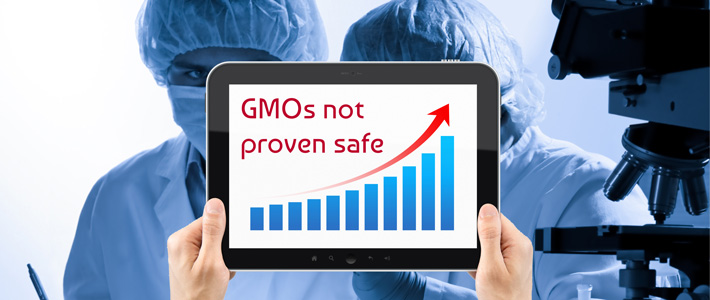
The number of scientists saying that there is no consensus on GM food safety just keeps growing.
297 scientists and experts agree GMOs not proven safe
*EU chief scientist Anne Glover’s backing for GM condemned as “irresponsible”
*Independent researchers work double shift to address “red flags” on GMO safety
Press release, European Network of Scientists for Social and Environmental Responsibility
10 Dec 2013, http://www.ensser.org/media/0713/
The number of scientists and experts who have signed a joint statement[1] saying that GM foods have not been proven safe and that existing research raises concerns has climbed to 297 since the statement was released on 21 October.
Dr Angelika Hilbeck, chair of the European Network of Scientists for Social and Environmental Responsibility (ENSSER), which published the statement, said, “We’re surprised and pleased by the strong support for the statement.
It seems to have tapped into a deep concern in the global scientific community that the name of science is being misused to make misleading claims about the safety of GM technology.”
The statement indirectly challenges claims by EU chief science adviser Anne Glover that there is no evidence that GM foods are no riskier than non-GM foods.[2]
Dr Rosa Binimelis Adell, board member of ENSSER, said, “It seems that Anne Glover chooses to listen to one side of the scientific community only – the circle of GMO producers and their allied scientists – and ignores the other. Thus she is giving biased advice to the EU Commission. For a science adviser, this is irresponsible and unethical.”
New signatories to the statement include Dr Sheldon Krimsky, professor of urban and environmental policy and planning at Tufts University and adjunct professor in the department of public health and family medicine at the Tufts School of Medicine. Dr Krimsky said:
“As a GMO crop skeptic, I have a more nuanced view of adverse consequences than uncritical proponents. Adverse consequences of GMO crops are not restricted to keeling over dead after eating genetically adulterated unlabelled food (GAUF). My concerns include subtle changes in nutritional quality or mycotoxins, increasing food allergens, unsustainable farming practices, dependency on chemical inputs, lack of transparency in evaluating food quality and safety, and the transformation of farming practices into a modern form of serfdom, where the seed is intellectual property leased by the farmer.
“To demonstrate the safety of GMO products, one must begin by assuming that they can be harmful, and carry out sensitive tests that are capable of detecting harm. As with other technologies like aeronautics and nuclear power, those who manufacture the products must not be the definitive source of safety data. Because rigorous safety testing has not happened with GMO crops, I remain skeptical.”
Another signatory, Dr Margarida Silva, biologist and professor at the Portuguese Catholic University, said, “Even if researchers did largely agree on GMO safety, that doesn't make them correct. To paraphrase Albert Einstein, it only takes one study to prove a whole theory wrong – no matter how many scientists believed in it.
“In addition, research has been mostly financed by the very companies that depend on positive outcomes for their business, and we now know that where money flows, influence grows. The few independent academics left must work double shift to address the vast array of unanswered questions and red flags that keep piling up.”
A third signatory, Dr Raul Montenegro, biologist at the University of Cordoba, Argentina, said:
"Usually, analysis of GMO safety fails to consider four main issues.
One:
GMO plants, seeds and byproducts contain not only residues of commercial chemical pesticides, but also insecticidal proteins produced by the plant, like the Bt toxin Cry1Ab.
Two:
each commercial pesticide contains a cocktail of chemicals that undergo chemical changes within pesticide containers, when mixed with other pesticides, and when released in the environment.
Three:
In GMO agriculture each crop cycle begins with a higher background level of commercial pesticides and insecticidal proteins accumulated in agricultural soil, people’s homes and gardens, and exposed people.
Four:
GMO agriculture adds unwanted biodiversity (GMO genes) in countries having less and less natural biodiversity as a consequence of deforestation, pesticides, GMO insecticidal proteins, and uncontrolled flux of engineered genomes.
“Countries such as Argentina and Brazil are paradises for GMO agriculture because their governments have not established monitoring systems for disease and deaths from all causes, along with monitoring of the accumulation of residues of pesticides and GMO insecticidal proteins in exposed people and the environment, and variation of natural biodiversity indexes. If these monitoring systems were in place, it would be possible to measure the effects of GMO agriculture. As things stand, the governments of these countries deny that there is a problem even in the face of numerous reports from the people who are affected and the doctors who must treat them.”
Notes
[1] http://www.ensser.org/increasing-public-information/no-scientific-consensus-on-gmo-safety/
[2] www.euractiv.com/science-policymaking/eu-chief-scientist-unethical-use-interview-530692









